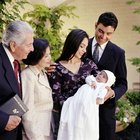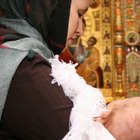Filipino parents are typically very close to their culture's roots. Many Filipinos have a high sense of pride about being a Filipino: their language, ethnicity and livelihood. Usually, Filipino parents try to pass on this pride and tradition to their children by giving an upbringing much like their own. In turn, ideal gifts for Filipino parents should symbolize this upbringing: the gifts should have a high degree of tradition, home and family.
Religious Items
The Philippines is primarily a Catholic country. Filipino families in general integrate religion deep in their lives and customs. Religious gifts such as rosaries, crosses and portraits of Jesus Christ represent these customs. Many Filipino parents actively use these gifts when conducting prayer meetings or Bible study sessions with their neighbors and friends. Additionally, a person could ask a priest to bless these items prior to giving them as gifts; these usually symbolize praying for the safety and prosperity of the parents.
Housewarming Gifts
Housewarming gifts are close to the parent's heart because of the Filipino's natural attachment to a home. Regardless of whether the home actually needs these gifts or not, these gifts enrich a home--making it even more ideal to stay in. Filipino parents typically will use even small items such as new kitchen utensils, flower vases and living room decor. For people who are more financially well-off, home appliances such as washing machines and microwave ovens may serve as good replacements for a parent's older appliances.
Money
Many Filipino sons and daughters work overseas to earn money for their families back home. In the U.S. for example, many money remittance centers are catered specifically for Filipino overseas workers. OFW's typically give their parents monetary gifts to show their support not only for the parents, but for the entire family as well. This is because it is embedded in Filipino culture that if a person becomes financially well-off, it is customary to give back to his parents and the family which he grew up with. This custom is not limited to lower class families--monetary gifts are given regularly between the family during holidays and family reunions.
Birthday Celebration
Birthday celebrations are particular for Filipinos because the entire family typically gets together to celebrate a single person's birthday. These celebrations include the extended family and friends and can easily become expensive. A meaningful gift would be to take responsibility for the entire expense and planning of a birthday party for the Filipino parent. This includes providing a house as the venue, preparing the logistics, accommodating the relatives and paying for the food expense. It is customary to share the responsibilities between the children in planning the event; in cases where there are only one or two children, they can reach out to close relatives and family friends for assistance.
Related Articles

Hispanic Baptism Gifts

Etiquette on the Costs of a Greek ...

The Purpose of Christening

What Is the Godparents' Responsibility ...

Bridal Bouquet Etiquette: Who Pays?

What Is the Proper Gift for People ...

Financial Responsibilities of the ...

What Does the Godmother Do for the ...

First Communion Money Giving Etiquette

The Godfather's Responsibilities on the ...

How Much Money Should I Give as a ...

Customary Nigerian Wedding Gifts

The Pros and Cons of Moving Out of Your ...

What Are the Duties of a Godparent?

Skills Needed for Parenting

Family Conflict Examples

How to Be a Good Aunt to a Niece Who's ...

What Is Transitional Housing?

Funeral Etiquette & Who Buys Casket ...

Second Wedding Gift Etiquette
References
- "Filipino Spiritual Culture"; Howard Q. Dee, et al.; 2003
- "The Filipino Moving Forward"; A. Sunga; 2007
Resources
- "People Empowerment by Filipino Values"; Tomas Quintin D. Andres; 1998
Writer Bio
Raleigh Kung has been a social-media specialist and copywriter since 2010. He has worked with various companies on their online marketing campaigns and keeps a blog about social-media platforms. Now, he mainly writes about online media and education for various websites. Kung holds a master's degree in management and entrepreneurship from the University of San Francisco.